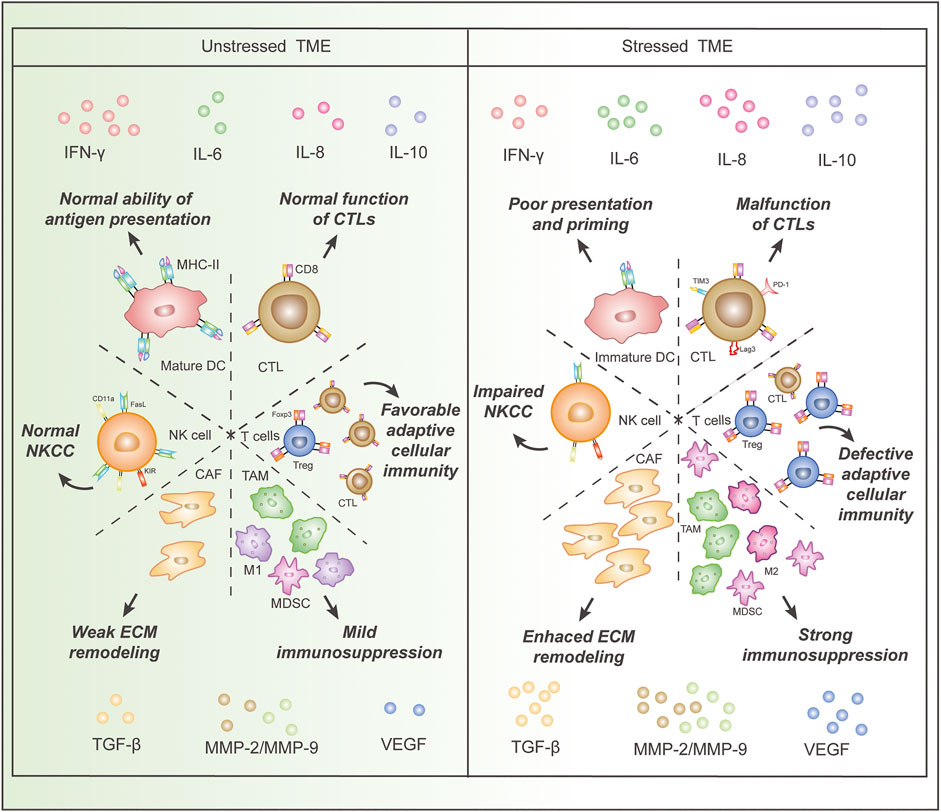- 1Department of Oncology, The Second Xiangya Hospital, Central South University, Changsha, China
- 2Xiangya School of Medicine, Central South University, Changsha, China
- 3Xiangya School of Public Health, Central South University, Changsha, China
- 4Hunan Cancer Mega-Data Intelligent Application and Engineering Research Centre, Changsha, China
- 5Hunan Key Laboratory of Tumor Models and Individualized Medicine, The Second Xiangya Hospital, Central South University, Changsha, China
- 6Hunan Key Laboratory of Early Diagnosis and Precision Therapy in Lung Cancer, The Second Xiangya Hospital, Central South University, Changsha, China
A corrigendum on
Chronic Stress: Impacts on Tumor Microenvironment and Implications for Anti-Cancer Treatments
by Tian, W., Liu, Y., Cao, C., Zeng, Y., Pan, Y., Liu, X., Peng, Y., and Wu, F. (2021). Front. Cell Dev. Biol. 9:777018. doi: 10.3389/fcell.2021.777018
In the original article, there were some mistakes in Figure 1 as published. 1) In the right part of Figure 1, “PD-L1” should be “PD-1”. 2) In the right part of Figure 1, “ITM-3” should be “TIM-3”. 3) In the right part of Figure 1, “dedective” should be “defective”. The corrected Figure 1 appears below.

FIGURE 1. Comparison of immune cells and cytokines in the stressed and unstressed tumor microenvironment (TME). Stressed TME is characterized by (I), decreased proportion and dysfunction of immune-supportive cells, including DCs and CTLs, as well as an increased proportion of cancer-promoting cells, such as MDSCs, Treg cells, CAFs, TAMs, and M2 macrophages; (II), increased concentrations of cytokines that impair anti-cancer immunity and induce angiogenesis, epithelial-mesenchymal transition, and extracellular matrix damage, as well as a decreased concentration of IFN-γ. Abbreviations: IFN, interferon; MMP, matrix metalloproteinase; IL, interleukin; TGF, transforming growth factor; VEGF, vascular endothelial growth factor; DC, dendritic cell; CTL, cytotoxic T lymphocyte, CAF, cancer-associated fibroblast; Treg, regulatory T cell; MDSC, myeloid-derived suppressor cell; TAM, tumor-associated macrophage;NK cell, natural killer cell; FasL, Fas ligand; NKCC, NK cell cytotoxicity; ECM, extracellular matrix.
In the original article, there was an error in the section, Anti-Cancer Treatments and Interventions Targeting Chronic Stress, β-Blocker. “The combination of propranolol and immune checkpoint inhibitors may improve the efficacy of immunotherapy.” should be “The combination of propranolol with targeted therapy may improve the efficacy.”, as the following part talks about targeted therapy.
A correction has been made to Anti-Cancer Treatments and Interventions Targeting Chronic Stress, β-Blocker, Paragraph 3:
“The combination of propranolol with targeted therapy may improve the efficacy. An exploratory analysis of the LUX-Lung3 study revealed a significant PFS prolongation of NSCLC patients taking β-blockers with EGFR-TKI afatinib compared with those taking afatinib alone (median 11.1 vs. 6.9 months, p = 0.0001), indicating there is a synergic effect combining β-blockers with anti-EGFR therapy (Nilsson et al., 2017)”.
The authors apologize for this error and state that this does not change the scientific conclusions of the article in any way. The original article has been updated.
Publisher’s Note
All claims expressed in this article are solely those of the authors and do not necessarily represent those of their affiliated organizations, or those of the publisher, the editors and the reviewers. Any product that may be evaluated in this article, or claim that may be made by its manufacturer, is not guaranteed or endorsed by the publisher.
Keywords: chronic stress, tumor microenvironment, glucocorticoid, catecholamine, anticancer treatment
Citation: Tian W, Liu Y, Cao C, Zeng Y, Pan Y, Liu X, Peng Y and Wu F (2022) Corrigendum: Chronic Stress: Impacts on Tumor Microenvironment and Implications for Anti-Cancer Treatments. Front. Cell Dev. Biol. 10:865043. doi: 10.3389/fcell.2022.865043
Received: 29 January 2022; Accepted: 02 February 2022;
Published: 04 March 2022.
Edited and reviewed by:
Daniele Vergara, University of Salento, ItalyCopyright © 2022 Tian, Liu, Cao, Zeng, Pan, Liu, Peng and Wu. This is an open-access article distributed under the terms of the Creative Commons Attribution License (CC BY). The use, distribution or reproduction in other forums is permitted, provided the original author(s) and the copyright owner(s) are credited and that the original publication in this journal is cited, in accordance with accepted academic practice. No use, distribution or reproduction is permitted which does not comply with these terms.
*Correspondence: Fang Wu, d3VmYW5nNDQ2MUBjc3UuZWR1LmNu
 Wentao Tian
Wentao Tian Yi Liu
Yi Liu Chenghui Cao1,2
Chenghui Cao1,2 Yue Pan
Yue Pan Yurong Peng
Yurong Peng Fang Wu
Fang Wu